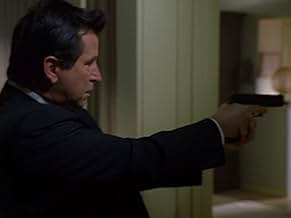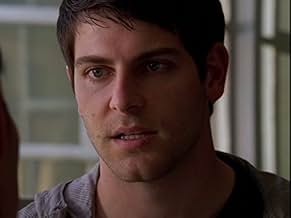Die Fälle einer FBI-Einheit, die sich auf die Untersuchung von vermissten Personen spezialisiert hat.Die Fälle einer FBI-Einheit, die sich auf die Untersuchung von vermissten Personen spezialisiert hat.Die Fälle einer FBI-Einheit, die sich auf die Untersuchung von vermissten Personen spezialisiert hat.
- 2 Primetime Emmys gewonnen
- 21 Gewinne & 47 Nominierungen insgesamt
Folgen durchsuchen
Empfohlene Bewertungen
I find this show engaging enough to watch fairly regularly but have to disagree with all the glowing reviews that have been posted. The plot lines are often simplistic and sensationalist and the long music-driven "emotional" scenes are pandering and boring. The characters are one dimensional and any "development" seems forced. I feel like Lenny on Law & Order is my good buddy even though that show hardly has any character development, whereas the WAT characters seem more like bullet points--"the wise, good hearted leader with family problems", "the tough blonde going through an emotional crisis", etc. The show is okay but it's really a slick presentation of something that could use a few more IQ points.
The early seasons were good! The story lines were well written mysteries. The romance between Poppy and Eric Close was a good idea. The romance between her and Anthony La Paglia was not!!
A little while ago,I'd written a user comment that was faintly praising and perhaps a little more than cruel in dismissing this show as a sort of pedestrian,superficial attempt at sincere drama that is acted well-enough and scripted competently enough to be interesting. After watching more episodes(mostly in re-runs) and getting roundly unsupported by those who bothered an opinion of my review,I decided to do a rewrite.
While I still stick by my assertion that this show isn't quite as innovative or searing as it aspires to be,it's still quite compelling a drama. While the acting varies,from superb and sublime(mostly Anthony LaPaglia as the chief,but Marianne Jean-BAptiste and Poppy Montgomery are good as fellow agents),to completely flat(mostly Roslyn Sanchez,who IS easy on the eyes but not much more),the stories DO draw the viewer in,and the earnest and deliberate means of spelling out the Bureau's investigating a missing case. Good storytelling that is not (ordinarily) as graphic or de-humanizing as a CSI episode,that still handles the subject manner soberly(if sometimes short-sighted),this show may not be my favorite on the telly,but I will watch it if it's on more often than not. That,to me,seems like a more accurate assessment.
While I still stick by my assertion that this show isn't quite as innovative or searing as it aspires to be,it's still quite compelling a drama. While the acting varies,from superb and sublime(mostly Anthony LaPaglia as the chief,but Marianne Jean-BAptiste and Poppy Montgomery are good as fellow agents),to completely flat(mostly Roslyn Sanchez,who IS easy on the eyes but not much more),the stories DO draw the viewer in,and the earnest and deliberate means of spelling out the Bureau's investigating a missing case. Good storytelling that is not (ordinarily) as graphic or de-humanizing as a CSI episode,that still handles the subject manner soberly(if sometimes short-sighted),this show may not be my favorite on the telly,but I will watch it if it's on more often than not. That,to me,seems like a more accurate assessment.
The show is still very good though my friends and I, who watch it together, agree with another viewer that Ms Sanchez ruined an excellent #10 show. There were already two women and a Spanish-American on board, so the show was politically correct and the ensemble fantastic. I never wished anybody (besides Hitler and heads of the soviet Union) to die, but I heartily wish that Ms Sanches' character would be shot for good and the show would return to its previous magnificence. Well, then I could purchase the following seasons' disks as well as those I had without Ms Sanchez' not enjoyable and unwanted presence. Could there be a possible hope in that direction? What a great thing it would be.
I am sorry that "Without A Trace" went off the air after five years, though I agree with other reviewers that it had probably exhausted its possibilities. The show had many things going for it: a first-rate cast, a set of often surprising plot twists, and an ability to look at some of the darkest parts of New York city life. Anthony LaPaglia, as the head of the FBI missing- persons unit, gave a set of performances that were truly gripping: his character was always tough, devoted, and often very reserved, but there was always an enormous amount of passion locked within him which would come out at the most desperate moments. The rest of the cast were uniformly good, and I agree with many other observers that Marianne Jean-Baptiste was a superb actress and a perfect colleague for LaPaglia's plain-spoken FBI man.
It is true, though, that as the years went by, the script writers appear to have run out of ideas about missing/abducted/brutalized persons and turned more and more to examining the personal lives of the FBI agents. We had love affairs between LaPaglia and Montgomery, Close and Montgomery, and Murciano and Sanchez, not to mention the collapse of LaPaglia's character's marriage, and the show did become more and more of a soap opera. It was probably at that point that the show started to lose the interest of its viewers.
But the single most important relationship in the show -- not a romantic relationship so much as a deeply personal relationship between two characters who really respected each other, even when they fought with each other -- was the relationship between LaPaglia's character and Jean-Baptiste's character. They were the stars of the show, and the way they agreed but often disagreed about their jobs and their lives made the show the wonderful, poignant success that it was for so many years.
It is true, though, that as the years went by, the script writers appear to have run out of ideas about missing/abducted/brutalized persons and turned more and more to examining the personal lives of the FBI agents. We had love affairs between LaPaglia and Montgomery, Close and Montgomery, and Murciano and Sanchez, not to mention the collapse of LaPaglia's character's marriage, and the show did become more and more of a soap opera. It was probably at that point that the show started to lose the interest of its viewers.
But the single most important relationship in the show -- not a romantic relationship so much as a deeply personal relationship between two characters who really respected each other, even when they fought with each other -- was the relationship between LaPaglia's character and Jean-Baptiste's character. They were the stars of the show, and the way they agreed but often disagreed about their jobs and their lives made the show the wonderful, poignant success that it was for so many years.
Wusstest du schon
- WissenswertesDuring each episode, a 15-second presentation appears, asking the public for help in finding real-life missing persons. The FBI provides a picture and descriptive information about the missing person to be displayed with a voice-over message recorded by one of the series stars.
- PatzerSince the inception of the agency, FBI agents travel in pairs when interview subjects. This is both to have a witness to the interview as well as for protection in case unexpected things occur. Multiple times during the show, single agents are shown talking with subjects alone, even in their homes or places unfamiliar to the agents.
- Zitate
Martin: I think he's sleeping with her. The way he talks about her and she's climbing that corporate ladder pretty quick.
Jack Malone: He may be in love with her, but he's not sleeping with her. Never even thought about it.
[Martin looks quizzically at Jack]
Jack Malone: He's gay.
Martin: What, because he called her a "fireball"?
Jack Malone: No... 'cause he was checking you out.
- Crazy CreditsAmongst the opening credits, for a brief moment the words "Amber Alert" are flashed on the screen. The Amber Alert system was formally inaugurated in the state of California, July 31, 2002. It drew both national and international recognition in its success in aiding authorities in their search for abducted children. In less than one year, the California Amber Alert system has been credited with aiding in the rescue of over a dozen children. The intial system was formulated in Texas in 1996, and is named after 9-year-old Amber Hagerman who was kidnapped and murdered. As of April 10, 2003 a bill creating a national Amber Alert system has passed in the House of Representitives, and unanimously approved in the Senate. "Without A Trace" (2002) aired its first episode shortly after a summer littered with nationally covered child kidnappings including the famous Elizabeth Smart abduction. The show aired Elizabeth's profile following its November 21, 2002 episode, In Extrimis. All Profiles are chosen by the FBI, not the show's producers.
- VerbindungenFeatured in The 55th Annual Primetime Emmy Awards (2003)
- SoundtracksOne (Is The Loneliest Number)
Performed by The Tao of Groove
Top-Auswahl
Melde dich zum Bewerten an und greife auf die Watchlist für personalisierte Empfehlungen zu.
- How many seasons does Without a Trace have?Powered by Alexa
Details
- Erscheinungsdatum
- Herkunftsland
- Offizieller Standort
- Sprache
- Auch bekannt als
- Without a Trace
- Drehorte
- Produktionsfirmen
- Weitere beteiligte Unternehmen bei IMDbPro anzeigen
Zu dieser Seite beitragen
Bearbeitung vorschlagen oder fehlenden Inhalt hinzufügen

Oberste Lücke
By what name was Without a Trace - Spurlos verschwunden (2002) officially released in India in Hindi?
Antwort


































